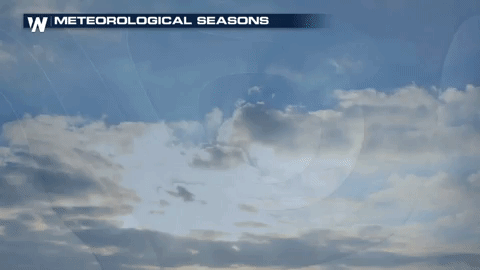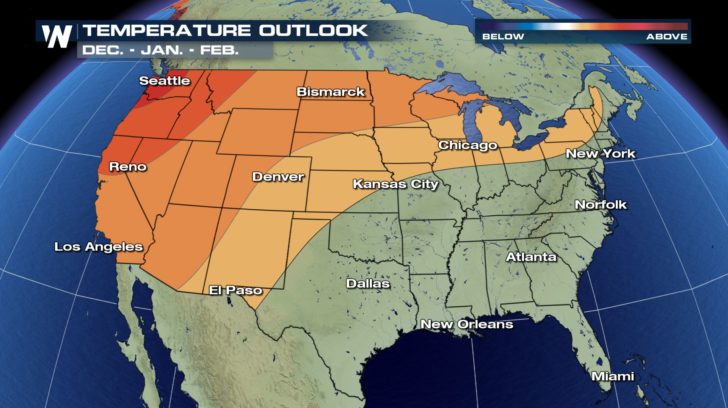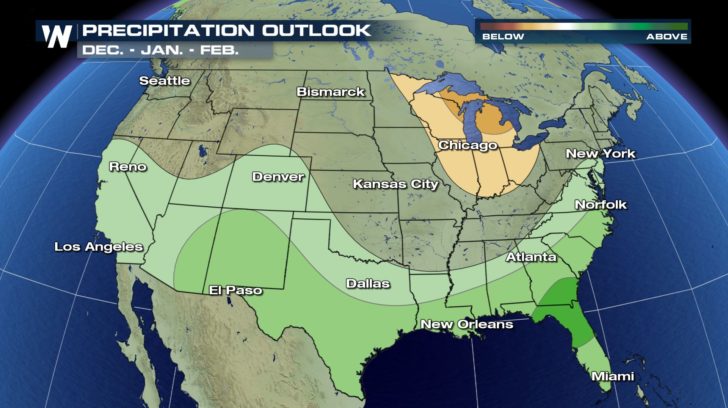Welcome (Meteorological) Winter
Special Stories
1 Dec 2018 8:00 AM
On Saturday, we turn the page of our calendars to December. When speaking in terms of weather and climate, we also begin a new season! Meteorological Winter begins on December 1st.
You may be thinking to yourself, “Wait, doesn’t Winter begin at the solstice?” Indeed it does. For millennia, people have been using the astronomical calendar to track all four seasons. The natural rotation of the Earth around the Sun forms the basis of this calendar. Seasons are defined by two solstices and two equinoxes. The tilt of the Earth and the alignment of the Sun over the equator determine the solstices and equinoxes. When using the astronomical seasonal calendar, then, Winter begins on December 21st this year.
The meteorological seasonal calendar, in contrast, is based on the annual temperature cycle. Meteorologists and climatologists break the seasons down into groupings of three months. Statistically speaking, Winter (December, January, February) is the coldest time of year and Summer (June, July, August) is the warmest. Spring and Fall are the transitional seasons in between.
 By using complete months and monthly increments, it is much easier to compute seasonal “normals” and averages. This allows the general public to better understand weather and climate trends and helps industries such as commerce and agriculture plan their year.
https://youtu.be/ezhXuorqDkQ
There are some interesting trends forecast in the Climate Prediction Center’s outlook for Meteorological Winter 2018-2019. Much of the northern and western United States—especially the Pacific Northwest—may witness warmer than normal temperatures.
By using complete months and monthly increments, it is much easier to compute seasonal “normals” and averages. This allows the general public to better understand weather and climate trends and helps industries such as commerce and agriculture plan their year.
https://youtu.be/ezhXuorqDkQ
There are some interesting trends forecast in the Climate Prediction Center’s outlook for Meteorological Winter 2018-2019. Much of the northern and western United States—especially the Pacific Northwest—may witness warmer than normal temperatures.
 As for precipitation, the southern United States may experience more rain than normal. Depending on temperature, that may include ice and snow as well. Northern Florida and southern Georgia have the best chance for more precipitation. The Great Lakes and Ohio Valley regions may end up drier than normal during this period.
As for precipitation, the southern United States may experience more rain than normal. Depending on temperature, that may include ice and snow as well. Northern Florida and southern Georgia have the best chance for more precipitation. The Great Lakes and Ohio Valley regions may end up drier than normal during this period.
 If you haven’t already, give WeatherNation a follow on Twitter and Facebook and we’ll be sure to keep you in the loop with all the top weather stories this Winter.
–Meteorologist Joe Astolfi
If you haven’t already, give WeatherNation a follow on Twitter and Facebook and we’ll be sure to keep you in the loop with all the top weather stories this Winter.
–Meteorologist Joe Astolfi
 By using complete months and monthly increments, it is much easier to compute seasonal “normals” and averages. This allows the general public to better understand weather and climate trends and helps industries such as commerce and agriculture plan their year.
https://youtu.be/ezhXuorqDkQ
There are some interesting trends forecast in the Climate Prediction Center’s outlook for Meteorological Winter 2018-2019. Much of the northern and western United States—especially the Pacific Northwest—may witness warmer than normal temperatures.
By using complete months and monthly increments, it is much easier to compute seasonal “normals” and averages. This allows the general public to better understand weather and climate trends and helps industries such as commerce and agriculture plan their year.
https://youtu.be/ezhXuorqDkQ
There are some interesting trends forecast in the Climate Prediction Center’s outlook for Meteorological Winter 2018-2019. Much of the northern and western United States—especially the Pacific Northwest—may witness warmer than normal temperatures.
 As for precipitation, the southern United States may experience more rain than normal. Depending on temperature, that may include ice and snow as well. Northern Florida and southern Georgia have the best chance for more precipitation. The Great Lakes and Ohio Valley regions may end up drier than normal during this period.
As for precipitation, the southern United States may experience more rain than normal. Depending on temperature, that may include ice and snow as well. Northern Florida and southern Georgia have the best chance for more precipitation. The Great Lakes and Ohio Valley regions may end up drier than normal during this period.
 If you haven’t already, give WeatherNation a follow on Twitter and Facebook and we’ll be sure to keep you in the loop with all the top weather stories this Winter.
–Meteorologist Joe Astolfi
If you haven’t already, give WeatherNation a follow on Twitter and Facebook and we’ll be sure to keep you in the loop with all the top weather stories this Winter.
–Meteorologist Joe AstolfiAll Weather News
More